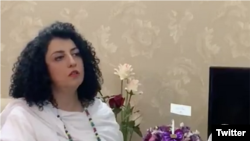Iran has freed a prominent female dissident jailed since 2015, following a years-long campaign by international rights activists demanding an end to what they described as her unjust and cruel detention.
Journalist and human rights advocate Narges Mohammadi, 48, was released from a prison in the northwestern city of Zanjan early Thursday, according to a tweet from her husband, Taghi Rahmani, who lives in exile in Paris with the couple’s two children.
In the tweet, Rahmani said he'd heard from relatives in Iran that his wife was released at 3 a.m. local time.
He later tweeted a video clip of Mohammadi at her parents’ home, singing a song in tribute to Mohammad Reza Shajarian, a beloved Iranian classical music singer whose death at age 80 after a battle with cancer also was announced Thursday.
Iranian state media quoted a judicial official as saying Mohammadi was released as part of a commutation of her 10-year prison term.
Speaking to VOA Persian, Rahmani said family members in Iran had told him that his wife apparently was woken up and informed of her release shortly before being allowed to leave the prison. “She currently is in a good mental state, but given her health problems in prison, she should be monitored by doctors,” he said.
Rahmani had made no further comment on Twitter by late Friday regarding whether he had spoken directly to his wife.
In an August message to VOA, Rahmani said Mohammadi needed specialized medical care outside prison for a lung disease and weakened immune system following surgeries in 2018 and 2019, as well as for beatings that she apparently sustained while being transferred to Zanjan prison in December.
London-based rights group Amnesty International has said Iranian authorities violently transferred Mohammadi to Zanjan from Tehran’s Evin prison, where she had been incarcerated since her arrest in May 2015. She was working as a spokesperson for Iranian dissident group Center for Human Rights Defenders at the time of her detention.
Rahmani’s August message also said his wife appeared to have recovered from coronavirus symptoms that she began experiencing in July. She reported those symptoms in a letter sent from prison to her supporters.
In his latest comments, Rahmani credited Mohammadi’s lawyers for helping to secure her freedom.
"There is no place for any civil or political activist in prison, and I wish that all such prisoners would have been included in this release," he said.
U.S. Ambassador to the U.N. Kelly Craft welcomed Mohammadi’s release in a Twitter post. But she also called on Iran to free all people who she said had been unjustly imprisoned, including Iranian human rights lawyer Nasrin Sotoudeh.
In another tweet, Amnesty International said Mohammadi had been unjustly jailed for over five years for her peaceful human rights activism. “Many thanks to everyone across the globe who worked tirelessly for her release!” the group wrote.
In a message sent to VOA Persian, U.N. Human Rights Office spokesperson Ravina Shamdasani welcomed Iran’s decision to free Mohammadi on the basis of a new amendment to Article 134 of the Iranian Penal Code, which she said allows an individual’s prison sentence to be shortened because of time already served.
Iranian authorities said they detained Mohammadi in 2015 to resume her six-year prison sentence from 2011 related to her peaceful human rights work. She was arrested and released several times in the six years preceding her 2015 incarceration.
Iran’s judiciary sentenced Mohammadi again in 2016 to an additional 10-year jail term for involvement with another peaceful advocacy group, the Campaign for Step by Step Abolition of the Death Penalty.
This year, Iranian authorities filed several new national security-related charges against Mohammadi for her peaceful human rights activism inside prison.
Rahmani said the outcome of those investigations was not yet clear, and his wife’s lawyers were continuing their work on her defense.
Shamdasani said the U.N. Human Rights Office “remain[s] concerned … that new charges were imposed against Mohammadi, who has a serious health condition, in June this year, and we call on the authorities to drop all criminal charges linked to her human rights work.”
Rahmani expressed hope that authorities would not bar his wife from leaving Iran to visit him and their children in France. He noted that their son and daughter have not seen Mohammadi for five years.
In July, Rahmani tweeted a video clip of his daughter, Kiana, and son, Ali, appealing for help in order to reconnect with their mother. Iranian authorities apparently barred her from speaking with them by phone.
In the clip, also shared by Amnesty, Ali said he and his sister hadn’t heard Mohammadi’s voice for 11 months.
“She should have the right to come and see her children,” Rahmani said. "What sin did her children commit that they should be deprived of a visit from their mother?”
This article originated in VOA’s Persian Service. Lipin reported from Washington and Yazdiha from Istanbul. Click here for the original Persian version of the story.





